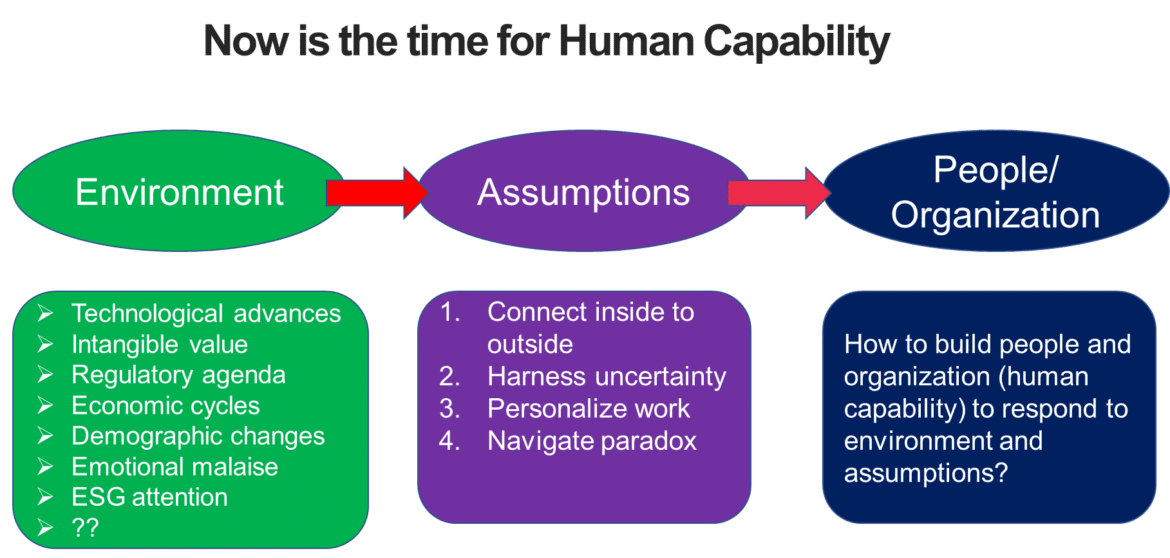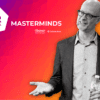
WHY SHOULD YOU CARE?
Gain valuable insights on how to navigate the ever-changing business landscape and elevate their role from personnel management to strategic enablers of human capability. Drawing from the wisdom of thought leader Dave Ulrich, the article explores four key assumptions that redefine HR’s value contribution – an outward approach, embracing uncertainty, personalization of work, and navigating complexity. HR leaders will discover actionable strategies to anticipate future organizational needs, foster agility, empower individuals, and effectively guide their organizations to success.
In the constantly shifting terrain of business, organizations grapple with a myriad of challenges stemming from technological advancements, societal shifts, political upheavals, economic fluctuations, environmental concerns, and evolving lifestyles. As the business landscape undergoes a metamorphosis, executives, boards, customers, investors, and regulators recognize the centrality of human capital and organizational issues.
In light of these trends, HR professionals are presented with an unparalleled opportunity to generate value in this ever-changing milieu. Esteemed thought leader Dave Ulrich outlines four emerging assumptions – which will be discussed in more details at the HORIZON SUMMIT in Amsterdam- that are revolutionizing the future of work and redefining HR’s role – an outward approach, embracing uncertainty, personalization of work experiences, and navigating complexity. Let us explore how these assumptions redefine HR’s value contribution and propel its evolution from personnel management to a strategic enabler of human capability.

An Outward Approach: Bridging the Divide
Traditionally, HR’s purview has revolved around internal processes and employee administration. However, the rapidly changing business environment necessitates a more all-encompassing approach. The “outside/in” assumption underscores the criticality of connecting internal organizational goals with external factors such as customer needs, market dynamics, and industry trends. This approach compels HR professionals to be proactive, anticipating future organizational needs, and aligning HR strategies with the broader business direction. By actively incorporating external influences into HR decision-making, HR becomes an enabler of the organization’s growth and success at the marketplace. As Dave Ulrich emphasizes: “The most important HR can offer is an organization that wins at the marketplace”
Embracing Uncertainty: Fostering Agility and Adaptability
In an era defined by rapid change and unpredictability, organizations must embrace rather than shy away from uncertainty. HR plays a pivotal role in fostering agility and adaptability within the workforce. This involves nurturing talent capable of flourishing amidst ambiguity and fostering a culture that embraces continuous learning and innovation.HR must take a proactive approach to identifying skills gaps and implementing robust training and development programs, ensuring a resilient and versatile workforce ready to tackle unforeseen challenges.
Personalization of Work: Empowering the Individual
Gone are the days when employees were content with a standardized approach to work. Today, they seek meaningful and personalized experiences that align with their unique skills, aspirations, and values. The “personalizing work” assumption places a premium on empowering individuals and granting them greater control over their careers. HR can facilitate this transformation by implementing flexible work arrangements, promoting inclusivity, and providing tailor-made opportunities for employee growth and development. Organizations foster a more engaged and motivated workforce by prioritizing individuals at the core of their HR practices.
Navigating Complexity: Embracing Ambiguity
In the intricate and interconnected world of business, companies often confront situations where competing demands and contradictory forces coexist. This is where the “navigating paradox” assumption comes into play. HR must adeptly manage seemingly conflicting objectives. For instance, balancing short-term profitability with long-term sustainability or maintaining centralized control while fostering decentralized decision-making. Embracing these paradoxes, HR expertly guides the organization through complex challenges, harmonizing seemingly opposing forces for seamless progress..
From Personnel to Human Capability: HR’s Transformative Journey
As HR responds to these emerging assumptions, it embarks on a transformative journey from a personnel-centric function to a strategic driver of human capability. This evolution marks a shift from being a mere administrative entity to becoming a catalyst for organizational growth. Leveraging data-driven insights and advanced analytics, HR professionals make informed decisions, influence strategic planning, and demonstrate the tangible impact of human capital on overall business performance.
In the face of a rapidly changing business landscape, HR professionals must navigate challenges and seize opportunities. Embracing an outward approach, uncertainty, personalized work experiences, and navigating complexity is crucial for creating value and driving success.
This evolution propels HR to transcend its traditional role and become a strategic partner, championing human capability as a primary driver of organizational growth. As Dave Ulrich wisely notes, it’s time for HR to rise to the occasion and shape the future of work and organizational triumph.
It is high time for HR’s New Horizon to rise: Reimagining Human Capability.
Meet Professor Dave Ulrich and 500 CHRO’s and their team at the HORIZON SUMMIT. See who is attending!

Written by: Mihaly Nagy
Future of Work HR Strategy Strategy & Transformation
Previous post

- 3754
labelArticles today2023.07.15.
From Buzzwords to Action: Navigating Continuous DEI Improvement in 2023
WHY SHOULD YOU CARE? Discover how redefining diversity, equity, and inclusion (DEI) can propel your organization to new heights of success. In this thought-provoking article, we explore the power of [...]
Similar posts

labelArticles today2024.10.21.
The success-recipe to build agile and future-ready organizations in 2025 and beyond








Post comments (0)